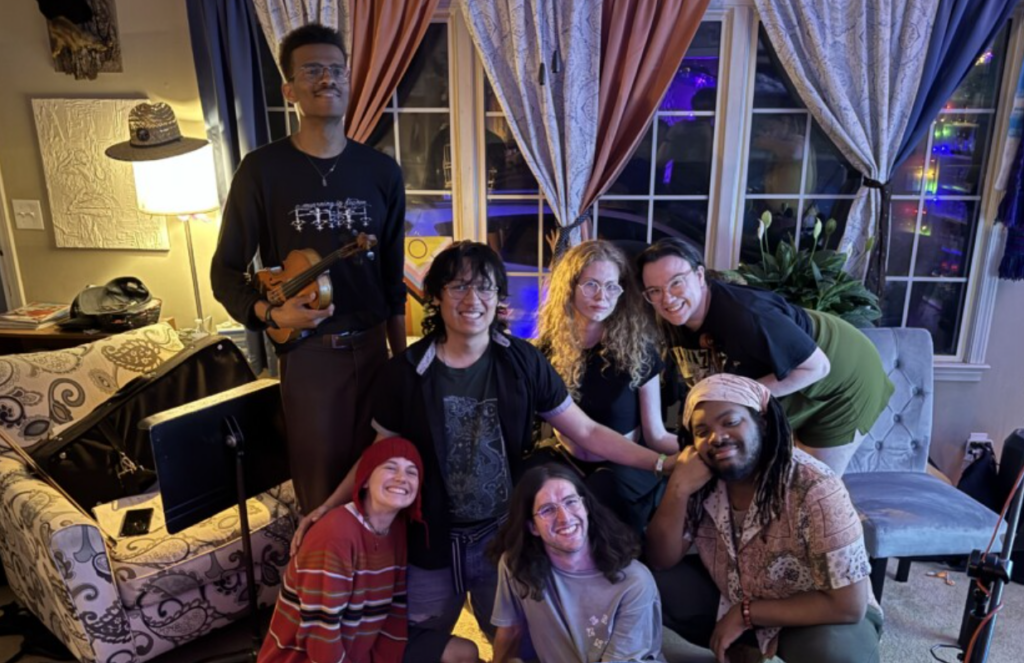‘Stands Alone

Though he’s been part of the Kansas City music scene for ten years, Chad Rex has no delusions about where he and his band fit in the local music community. “If there’s an under-underground, that’s where we’re sitting,” Rex says matter-of-factly.
That situation should be changing soon, thanks to the release of Songs to Fix Angels, the debut disc from Chad Rex and the Victorstands. The disc, an astounding collection of mature, richly composed American music, should elevate Rex’s reputation in the rest of the nation too. Its songs slip from spare acoustic numbers to crunchy blasts that forge the rawness of the Replacements with the twang and thunder of Mike Ness’ Social Distortion, early Drivin’ & Cryin’ and the rockier side of Steve Earle.
“It’s that Midwestern sound, that singer-songwriter-type music,” Rex says. “It’s not such a tight pop-rock sound but kind of loose, almost sloppy.” For Rex, the appeal of acts such as the Replacements, Wilco and Son Volt is their ability to pair attitudes and chops with attention to strong songs. “They might not have had the best singers, but they evoke a certain emotion,” Rex says. “The lyrics are not as run-of-the-mill as the poppy stuff, where the lyrics are secondary. The lyrics are the thing, and the music is really the soundtrack for them.”
Rex’s hefty songwriting skills owe something to his high-caliber influences, particularly a couple of Midwestern songwriters. “The two Bobs,” Rex says. “Bob Mould of Hüsker Dü, who pretty much got me through the ’80s, and Bob Dylan, who got me through the ’90s.” He cites Blonde on Blonde and Blood on the Tracks as major influences. “For about three years, that was all I ever listened to. Blood is like the Writers’ Bible to me.”
Songs to Fix Angels boasts cuts that carry the stamp of both Mould (on the disc’s blistering power-and-western tunes) and Dylan (in its plaintive unplugged numbers). All of these selections feature whittled-down lyrics rich on cliché-crushing wordplay and sticky melodies. Recorded at Kansas City’s Wheeler Studio, Songs‘ most obvious merit is a bone-dry, live-in-the-studio feel (a sound that’s somewhat surprising considering the disc was recorded completely on Pro Tools software).
On its softer side, Songs offers Americana gems that echo the Civil War sound of the Band or Wilco without the over-earnestness. “Tied up to Die” is a dark little narrative wrapped up in acoustic guitars, mandolins and accordions, while “Hearsay Discovered” is achy country rock with a weary chorus perfect for Rex’s reedy, amber-waves-of-grain voice. “Parting Dress” is a piano-blessed fading-love song that fills a similar niche and sports brain-tickling lines — Love is blind and sometimes deaf/and sometimes won’t commit — that paint fresh colors on age-old topics. The title of “Back to the Breakdown” makes it seem like some weeping-in-your-heroin tale for the terminally depressed, but in Rex’s hands, returning to the deepest of blues turns out to be a rollicking tale of no depression that makes the prospect of losing one’s mind seem downright inviting.
“I hope it’s not ‘poor me’-ish,” Rex says of his focus on mental anguish. “I try to put an element of optimism in there, and the music doesn’t sound like The Smiths.”
Rex’s acoustic tunes have endeared him to fans in coffee houses and bookstores around the Kansas City area, where he’s been doing solo shows for the past couple years. But Songs sports a second dynamic that’s aimed at fans of harder, plugged-in music. The drumming of Rex’s brother, Scotty, and his own bone-breaking guitar work propel the album’s handful of supreme rockers to greatness. Rex’s guitar sound, which he gets by pushing a Telecaster through a Matchless amp, is the tone of amplified angels, what rock-and-roll guitars surely sound like in heaven. Its thick, rich distortion takes wing on the disc’s solos, short salvos in which Rex delivers more excitement in a few seconds than most guitarists do in entire sets.
On “Desperate and Poisoned,” Rex launches a solo with a squeal of feedback before blasting through a grungy groan or two and a howling country string-bend, followed by a descending run that ends in a searing note of vibrato. On “Blue Memory,” he hits a similar peak, slicing open a tale of crosses, hearses and skeletons with a ten-second stab of Stooges-style guitar bliss.
Songs achieves the nearly impossible task of stretching from front-porch folk to glorious roots rock, but Rex seems a bit reluctant to brand his sound alt-country. “I think we have a country feel every once in a while, but we’re just a rock-and-roll band,” Rex says. “I mean, I love to listen to Merle Haggard and I love that old drinking-beer country music. But I think if I tried to do that kind of music, it would sound like I was trying. And I think people are smart enough to tell who is telling the truth and who isn’t. I’m a pop-rock songwriter who takes it more seriously than maybe a bar rock band normally would. And we tend to be mean about bands that are country for country’s sake.”
Rex politely declines to drop names of the bands that might earn his ire for such shenanigans, but he admits his knack for successfully playing quiet songs in solo shows and roaring rock with his band has created a few problems on his home turf. He says his loyal acoustic audience in Kansas City has shied away from seeing him in the electrified band format. But, he notes, his emphasis on songsmithing is helping him attract a better breed of bar patrons. “In the bar scene a lot of people don’t really pay much attention to bands, but we have a lot of people pay attention to us,” Rex says with pride. “Our fans are people who like singer-songwriters, people who take their music a little more seriously.”
He and his mates have gained attention in some of the Kansas City area’s smaller venues, including The Pub, Davey’s Uptown and the late Pyro Room, but so far they’ve received little notice from the Kansas City music media. But, Rex says bluntly, “I’ll change that this year. For a long time, we kept ourselves low-key and didn’t really play out and force ourselves on other people, which is probably why we didn’t get a lot of attention before. I’m taking it all a lot more seriously now.
“None of us are getting any younger,” Rex continues, explaining the motivation for his new focus. “And the more and more I’ve done other types of work, I’ve realized this is how I want to make some sort of living, even if it’s a meager one. And I’ve realized, in a nonegotistical way, that I could probably get away with this.” These days, Rex says, “I think I can actually write a song now and not have to think about it and know what I’m doing. It’s easier and what I enjoy doing. It’s the only thing I enjoy doing other than fishing. And I don’t think I can make any money off of fishing.”




